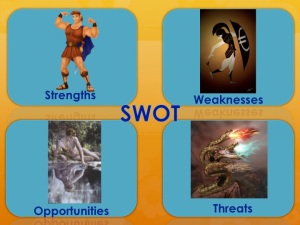Having a 14 year old is probably the most humbling/ nightmarish experience ever! You may be the superwife, super daughter, even supermom till now, the highest achiever by all standards – professionally, personally, whatever – but “mom-of-14-year-old” strips you of all accolades!
You become meanest mom, most hated person, evil heartless monster, insensitive and non understanding, torture chamber, slave driver, etc etc etc person ever – actually, I have to admit – this is not only in the 14 year old’s imagination, but in fact! SOMETHING happens at 13-14 when both you and your thus far sweet child transmogrify into separate evil avatars!
I think most folks facing this issue do the usual self help book/ counseller visit/ friend shoulder rant and rave – but, apart from all of this, I have done deep analysis, and I think at the heart lies the problem of GO.S.H, HA.G.S, or..erm..excuse the french…S.HA.G….
Essentially, what do most parents want for their children? Apart from Good health, which is the overarching, most important thing; I think it is the following:
– That they are GOOD – they don’t lie/ cheat/ cause harm to others or themselves/ no criminal tendencies etc, and that they are sensitive to others’ misfortune and try to help others
– That they are SUCCESSFUL – They do well/ exploit their potential – (doesn’t matter in what field – Howard Gardner and his theory of Multiple Intelligences has only formalised what most parents knew) and are able to earn decent money to keep themselves in similar (or better) circumstances than they have been brought up
– Most importantly, that they are HAPPY – feel fulfilled/ loved/ in a good place/ not sad/ depressed/ don’t feel their “life” sucks etc etc…..
Now, in my opinion, parents wants their kids to have ALL three of these – even a 2/3 is not good enough (i.e., a thief may be successful and happy, but is NOT good — and so on)
It is precisely these 3 things – their relative juxtaposition/ the priority, and even the existence – that causes the teenage parent angst!
So, i wd think most of us raise our kids to try and be good – this is what you teach them from when they are – (to get all Shakespearean about it) – mewling and puking in their mum’s hands. To teach them “don’t tell lies, help the elderly cross a road, not to bully”….
This really is a foundational thing.
The next thing is – and this quest begins at various stages – depending on the parent/ the child/ the school/ the country….we try and steer our kids towards “success” – the choice of school, of other skill “classes”, their popularity amongst peers, their habits….
This is I think where the biggest man-trap happens – coz, very often, your definition of success ain’t their’s (and understandably so). For you, their “success” often goes beyond the here and now – and is also aimed towards the future (bade hokar kya karogey??). In addition, it is coloured by YOUR experience of the growing up years, and YOUR vision of how their future will be – they obviously don’t know this at all.
Ofcourse, above all, we want our kids to be happy – but in our view, the happiness comes partly from being good and being successful (or, to be more exact, doesn’t come – at least in the future – unless they are good and they are successful).
Refer to Fig 1 of my handwritten diagram above.
The problem is because for the kids, success IS being happy…So, kids, if they view this GOSH/ SHAG/ HAGS thing at all – view it as Fig 2 – where they are NOT dependent on each other but 3 mutually exclusive axes!
In addition, they have to deal with the problem of, in order of priority, shd one chase GOSH/ HAGS/ SHAG/ GOHS/ HASG or SGHA……confusing right? even for us? Those poor 14 year olds get completely messed up heads 😦
And THAT is the root of all the stress and distress.
The only silver lining is a recent whatsap forward to me (the fates must have sensed my utter depression, coz I got it no less than FIVE times yesterday!):
Taken from a handout by Corrie Lynne Player:
“I just realized that while children are dogs—loyal and affectionate—teenagers are cats.
It’s so easy to be a dog owner. You feed it, train it, boss it around. It puts its head on your knee and gazes at you as if you were a Rembrandt painting. It bounds indoors with enthusiasm when you call it.
Then, around age 13, your adoring puppy turns into a big old cat. When you tell it to come inside, it looks amazed, as if wondering who died and made you emperor.
Instead of dogging your footsteps, it disappears. You won’t see it again until it gets hungry…then it pauses on its sprint through the kitchen long enough to turn up its nose at whatever you’re serving, swishing its tail and giving you an aggrieved look until you break out the tuna again.
When you reach out to ruffle its head in that old affectionate gesture, it twists away from you, then gives you a blank stare as if it is trying to remember where it has seen you before.
You, not realizing your dog is now a cat, think something must be desperately wrong with it. It seems so antisocial, so distant, sort of depressed. It won’t go on family outings. Since you’re the one who raised it, taught it to fetch, stay and sit on command, you assume you did something wrong. Flooded with guilt and fear, you redouble your efforts to make your pet behave.
Only now you’re dealing with a cat, so everything that worked before now has the opposite result. Call it, and it runs away. Tell it to sit, and it jumps on the counter. The more you go toward it, wringing your hands, the more it moves away.
Instead of continuing to act like a dog owner, you must learn to behave like a cat owner. Put a dish of food near the door and let it come to you. But remember that a cat needs your help and affection too. Sit still and it will come, seeking that warm, comforting lap it has not entirely forgotten. Be there to open the door for it.
One day your grown up child will walk into the kitchen, give you a big kiss and say,
“You’ve been on your feet all day. Let me get those dishes for you.” Then, you’ll realize your cat is a dog again.”

Essentially saying – “This too shall pass”. Amen to that! Waiting eagerly for that day……

















